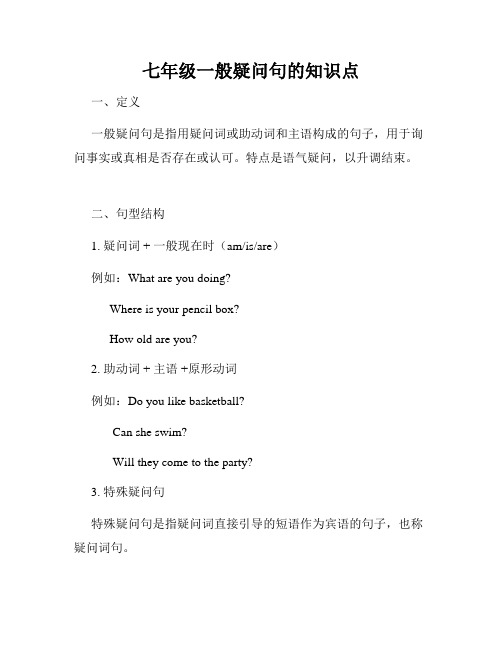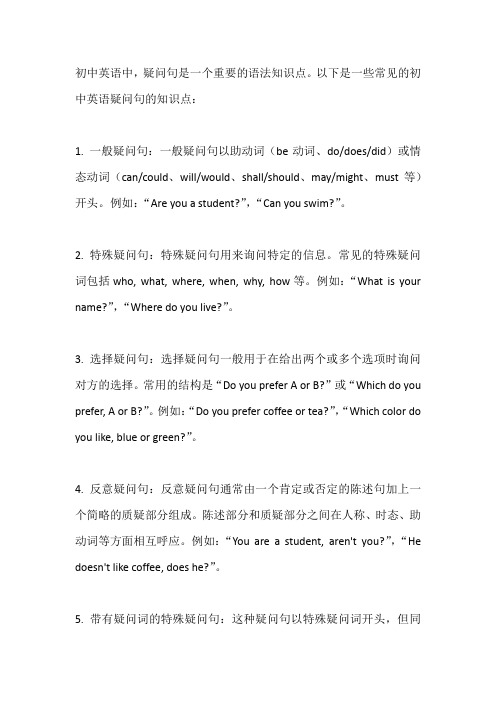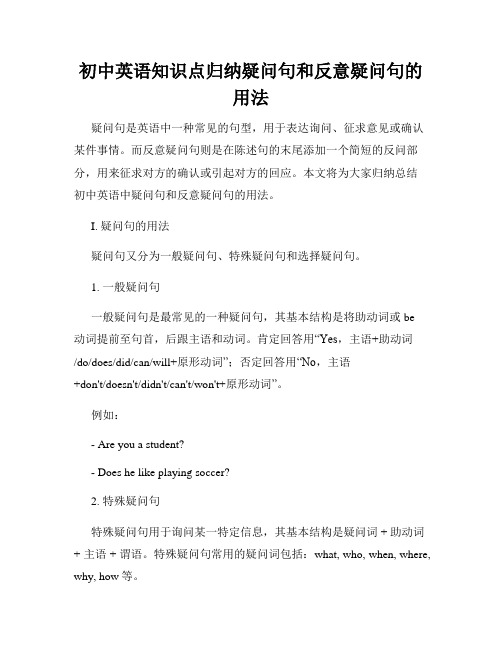初中英语语法知识—疑问句的知识点复习(3)
初中英语知识点归纳疑问句的分类和用法

初中英语知识点归纳疑问句的分类和用法在初中英语学习中,疑问句是非常重要和常用的语法结构之一。
掌握各种疑问句的分类和用法,可以帮助我们更准确地提问和理解他人的问题。
本文将就初中英语知识点归纳疑问句的分类和用法展开论述。
一、一般疑问句一般疑问句是用来征询基本事实的疑问句,其基本句型结构为:助动词(或be动词)+主语+谓语(其余成分)。
疑问句通常以问句形式结尾,例如:"Do you like swimming?"(你喜欢游泳吗?), "Is she a doctor?"(她是医生吗?)。
二、特殊疑问句特殊疑问句用于征询对特定信息或事实的询问,常用的特殊疑问句包括:疑问词(who, what, when, where, why, how等)+一般疑问句句型。
以下是常见的特殊疑问句的用法:1. What:用于询问事物、活动或情况。
- What's your favorite color?(你最喜欢的颜色是什么?)- What do you want to be in the future?(你将来想成为什么?)2. Where:用于询问地点或位置。
- Where is the nearest bus stop?(最近的公交车站在哪里?)- Where did you go for your last vacation?(你上次去了哪里度假?)3. When:用于询问时间或日期。
- When is your birthday?(你的生日是什么时候?)- When did you start learning English?(你何时开始学英语?)4. Who:用于询问人物身份或者做某事的人。
- Who is your best friend?(你最好的朋友是谁?)- Who wrote the book "Pride and Prejudice"?(谁写的《傲慢与偏见》?)5. Why:用于询问原因或理由。
七年级一般疑问句的知识点

七年级一般疑问句的知识点一、定义一般疑问句是指用疑问词或助动词和主语构成的句子,用于询问事实或真相是否存在或认可。
特点是语气疑问,以升调结束。
二、句型结构1. 疑问词 + 一般现在时(am/is/are)例如:What are you doing?Where is your pencil box?How old are you?2. 助动词 + 主语 +原形动词例如:Do you like basketball?Can she swim?Will they come to the party?3. 特殊疑问句特殊疑问句是指疑问词直接引导的短语作为宾语的句子,也称疑问词句。
疑问词包括:who, what, when, where, which, how, how much/many等例如:Where do you live?How many sisters do you have?Who is your teacher?三、回答一般疑问句的回答有两种情况:1. Yes或No 回答例如:Do you like music? Yes, I do. / No, I don’t.Is your father a doctor? Yes, he is. / No, he isn’t.2. 对照回答例如:What are you doing? I am reading a book.How old are you? I am thirteen years old.Where is your bag? It’s under the desk.四、注意事项1. 疑问词是动词或介词时,要注意词序,其它疑问词则不需要注意例如:What are you looking for?Who are you talking to?2. 如果特殊疑问句中在句中作主语或者宾语的疑问词是人,那么将其作为主语或宾语,谓语动词要用复数形式。
最新初中英语语法知识—疑问句的知识点复习(3)

一、选择题1.—Is the young woman playing the violin?—________.A.Yes,she is B.No,she doesn'tC.Yes,she does D.No,he isn't2.They like playing football, ________?A.do they B.don’t they C.aren’t they D.are they3.—________ hours do you exercise every day? —Two.A.How long B.How often C.How much D.How many 4.—________— It is orange.A.What is this? B.What color is it? C.What are these? D.What color are they? 5.—Is your name Kangkang? —________A.Yes, I am. B.No, I’m not.C.Yes, it is. D.Yes, it’s.6.—__________ your name, please?—Yes, B-E-N, Ben.A.How do you spell B.How can you speakC.Can you spell D.What is7.—Where__________ your friend __________from?—He comes from England.A.is; come B.do; come C.does; come D.are; be 8.—He’s never stolen anyt hing before,______ he?—______. It’s his third time to be taken to the police station.A.hasn’t:Yes B.is;Yes C.has;Yes D.has;No9.---Is Alice writing? ---__________. She is listening to music.A.Yes, she isB.Yes, she doesC.No, she doesn’tD.No, she isn’t10.— ______ can I keep the books, madam?— For two weeks.A.How long B.How many C.How often D.How much 11.— Why ______ you like the cat?—Because she’s kind of ______.A.do; boring B.don’t; interesting C.do; interested D.don’t; boring 12.—_____ the population of the U.S.A.in 2005? —It _____ about 296 million.A.What is; is B.What was; was C.How many is; was D.How many was; is 13.—Could I smoke here?—____. Look at the sign” No smoking!”A.Yes, you may. B.Of course you can.C.No, you can’t.D.No, you couldn’t.14.— Books are our friends. ________ do you read books?— I read books every day.A.How soon B.How much C.How often 15.—________ is it from the New Town to the old city centre?—About 30 minutes by underground.A.How soon B.How often C.How long D.How far 16.— does he go to visit his grandparents?—Usually twice a month.A.How often B.How soon C.How far D.How long17.—How is everything going at school ,dear ?—________.A.All right, thanks. B.Not too bad, I guessC.That’s right.D.I’m glad to hear that.18.—________ are your shoes, dear? — Size 40.A.What’s size B.How much C.What D.What size 19.— Excuse me, ________ is it from here to Zhongshan Park?—It's about thirty minutes’ walk.A.how long B.how often C.how far D.how much 20.- ______ do you go to visit your grandparents?- Once a week.A.How far B.How much C.How often D.How long 21.—Is Billy rat or thin?—________.A.Yes, he is B.No, he isn't C.He's a new boy D.He's fat 22.一______________ do you have a medical examination?一Once a year.A.How soon B.How long C.How often D.How far 23.— Could you play the piano when you were 8 years old?— ________.A.Yes, I could B.No, I can’t C.Yes, I can D.No, I won’t 24.________your brother________ a baseball?A.Do; have B.Does; has C.Does; have D.Do; has 25.— __________ books do you read every year?— About 30, I love reading.A.How much B.How old C.How many D.How often【参考答案】***试卷处理标记,请不要删除一、选择题1.A解析:A【解析】句意:-----那个年轻女子在拉小提琴吗?----是的,她在拉小提琴。
初中英语知识点归纳一般疑问句的变化与回答

初中英语知识点归纳一般疑问句的变化与回答一、一般疑问句的基本结构及变化规则在初中英语学习中,我们经常会遇到一般疑问句。
一般疑问句是用于询问某个陈述句的真实性或确认某个说法的问句形式。
下面我们来归纳一下一般疑问句的基本结构及变化规则。
1. 陈述句结构:主语 + 动词 + 其他成分例如:You like football.中文意思:你喜欢足球。
2. 一般疑问句结构:助动词 + 主语 + 动词 + 其他成分?例如:Do you like football?中文意思:你喜欢足球吗?3. 助动词的变化规则:a. 变为否定疑问句时,助动词用do/does/did,主语要用否定形式。
例如:Don't you like football?中文意思:你不喜欢足球吗?b. 主语为第三人称单数时,助动词用does,其他形式不变。
例如:Does he like football?中文意思:他喜欢足球吗?4. 回答一般疑问句时的基本方式:a. Yes回答:表示肯定回答。
例如:Do you like football? Yes, I do.中文意思:你喜欢足球吗?是的,我喜欢。
b. No回答:表示否定回答。
例如:Do you like football? No, I don't.中文意思:你喜欢足球吗?不,我不喜欢。
二、一般疑问句的特殊情况及回答方式除了基本的一般疑问句结构和变化规则外,还存在一些特殊情况。
下面我们来看一下这些特殊情况及相应的回答方式。
1. 一般疑问句中的特殊疑问词:a. 特殊疑问词一般用来询问某个具体信息,如地点、时间、原因等。
例如:Where does he live?中文意思:他住在哪里?b. 特殊疑问词在一般疑问句中通常出现在句首,然后按照一般疑问句的结构进行变化。
例如:What do you want to eat?中文意思:你想吃什么?2. 含有情态动词的一般疑问句:a. 当一般疑问句中含有情态动词时,将情态动词放在句首,然后按照一般疑问句的结构进行变化。
初中英语疑问句知识点

初中英语中,疑问句是一个重要的语法知识点。
以下是一些常见的初中英语疑问句的知识点:1. 一般疑问句:一般疑问句以助动词(be动词、do/does/did)或情态动词(can/could、will/would、shall/should、may/might、must等)开头。
例如:“Are you a student?”,“Can you swim?”。
2. 特殊疑问句:特殊疑问句用来询问特定的信息。
常见的特殊疑问词包括who, what, where, when, why, how等。
例如:“What is your name?”,“Where do you live?”。
3. 选择疑问句:选择疑问句一般用于在给出两个或多个选项时询问对方的选择。
常用的结构是“Do you prefer A or B?”或“Which do you prefer, A or B?”。
例如:“Do you prefer coffee or tea?”,“Which color do you like, blue or green?”。
4. 反意疑问句:反意疑问句通常由一个肯定或否定的陈述句加上一个简略的质疑部分组成。
陈述部分和质疑部分之间在人称、时态、助动词等方面相互呼应。
例如:“You are a student, aren't you?”,“He doesn't like coffee, does he?”。
5. 带有疑问词的特殊疑问句:这种疑问句以特殊疑问词开头,但同时也包含了一般疑问句的结构。
例如:“What time do you usually get up?”,“How often do you exercise?”。
学生在学习疑问句时需要注意以下几点:-疑问句的变换方式,如将陈述句转换为一般疑问句、特殊疑问句等;-特殊疑问词的使用及其不同的含义和用法;-语序的变化,特别是特殊疑问句中主语和谓语的位置变化。
初中英语知识点归纳疑问句和反意疑问句的用法

初中英语知识点归纳疑问句和反意疑问句的用法疑问句是英语中一种常见的句型,用于表达询问、征求意见或确认某件事情。
而反意疑问句则是在陈述句的末尾添加一个简短的反问部分,用来征求对方的确认或引起对方的回应。
本文将为大家归纳总结初中英语中疑问句和反意疑问句的用法。
I. 疑问句的用法疑问句又分为一般疑问句、特殊疑问句和选择疑问句。
1. 一般疑问句一般疑问句是最常见的一种疑问句,其基本结构是将助动词或be动词提前至句首,后跟主语和动词。
肯定回答用“Yes,主语+助动词/do/does/did/can/will+原形动词”;否定回答用“No,主语+don't/doesn't/didn't/can't/won't+原形动词”。
例如:- Are you a student?- Does he like playing soccer?2. 特殊疑问句特殊疑问句用于询问某一特定信息,其基本结构是疑问词 + 助动词+ 主语 + 谓语。
特殊疑问句常用的疑问词包括:what, who, when, where, why, how等。
例如:- What is your name?- Where do you live?3. 选择疑问句选择疑问句用于提供选择的问题,其基本结构是“Or”连接两个陈述句。
其中,前一陈述句用正语序,后一陈述句用部分倒装语序。
回答选择疑问句时,可以根据实际情况选择其中一个选项进行回答。
例如:- Would you like tea or coffee?- Do you prefer basketball or football?II. 反意疑问句的用法反意疑问句用于在陈述句的末尾添加反问部分,并且正反之间一般存在意义上的对立或前后关系。
基本结构为:陈述句,正反疑问句。
1. 使用助动词当陈述句中有助动词时,反意疑问句一般使用助动词的缩略形式。
例如:- You can swim, can't you?- He likes playing tennis, doesn't he?2. 使用be动词当陈述句中是be动词时,反意疑问句中使用do作为辅助动词。
初中英语疑问句的知识点详解(初中英语疑问句)整理

让知识带有温度。
初中英语疑问句的知识点详解(初中英语疑问句)整理学校英语疑问句的学问点详解(学校英语疑问句)在我们平凡的同学生涯里,是不是听到学问点,就立即糊涂了?学问点也可以理解为考试时会涉及到的学问,也就是大纲的分支。
把握学问点有助于大家更好的学习。
以下是我收集整理的学校英语疑问句的'学问点详解(学校英语疑问句),供大家参考借鉴,盼望可以关心到有需要的朋友。
一般疑问句句型[特别定式动词+主语+(not)谓语+其他]1. Are you going with us? - Yes, Im.2. Have you had any news of your horse this morning? - Yes, hes fit as a fiddle.3. Do you like your house? - Oh, fearfully. Wont you come and see it?4. Can you not (= cant you) walk a little faster?5. Ought we not (=Oughtnt we) to give him a chance to try?句型94[Do (does, did) +主语+(not)谓语+其他]1. Do you happen to know Mr. Coopers address?2. Did you have a good time?第1页/共2页千里之行,始于足下。
3. Does this bus take me to Oxford Circus? - Yes, get on, please.[注] 要留意对否定句的回答与汉语习惯不同,如:1. Didnt you speak to him yesterday? No, I didnt. Yes, I did.2. Arent you of the Han nationality? Yes, I am. No, I am not.反义疑问句句型[陈述句(确定),+特别定式动词(否定)+主语]1. You study English, dont you? - Yes, we do.2. They have decided not to go, havent they? Yes, they have.3. You like it, dont you?4. Hes ready, isnt he?句型[陈述句(否定),+特别定式动词(确定)+主语]1. You wont be away for long, will you? - No, Ill be back in an hour or so.【学校英语疑问句的学问点详解(学校英语疑问句)】文档内容到此结束,欢迎大家下载、修改、丰富并分享给更多有需要的人。
疑问句知识点总结

疑问句知识点总结疑问句是一种用来提出问题或询问信息的句子,通常以疑问代词或疑问词开头。
疑问句在日常交流中应用广泛,能够帮助人们获取所需的信息,表达好奇、疑惑或不确定的情绪。
疑问句的构成方式多样,包括倒装句、特殊疑问句和一般疑问句等。
下面将从这几个方面对疑问句的知识点进行总结。
一、倒装句倒装句是指将谓语动词或其它成分提前,主语放在谓语动词之后的句子结构。
在疑问句中,倒装句常常用于强调或转折的语境中。
常见的情况包括以下几种:1. 以“here, there, in, out, up, down”等副词开头的句子。
例如:Here comes the bus.(车来了。
)There goes the bell.(铃响了。
)2. 以表示方向的短语或副词开头的句子。
例如:Out rushed the children.(孩子们冲了出来。
)Up jumped the cat.(猫跳了起来。
)3. 表示状态、感叹或疑问的句子。
例如:Never had I seen such a beautiful sunset.(我从未见过如此美丽的日落。
)So dark is the night.(夜色如此黑)。
4. 否定词位于句首的句子。
例如:Not until last year did I realize the importance of health.(直到去年我才意识到健康的重要性。
)5. 以连词或副词短语引导的句子。
例如:Little did she know that she was being watched.(她小小的时候并不知道她正在被监视。
)Seldom does he go to the cinema.(他很少去电影院。
)倒装句的运用需要根据具体语境进行判断,同时也需要注意谓语动词的形式和语序的变化。
二、特殊疑问句特殊疑问句是以特殊疑问词开头的问句,用以询问特定信息。
特殊疑问词包括what, where, when, why, who, how等。
- 1、下载文档前请自行甄别文档内容的完整性,平台不提供额外的编辑、内容补充、找答案等附加服务。
- 2、"仅部分预览"的文档,不可在线预览部分如存在完整性等问题,可反馈申请退款(可完整预览的文档不适用该条件!)。
- 3、如文档侵犯您的权益,请联系客服反馈,我们会尽快为您处理(人工客服工作时间:9:00-18:30)。
一、选择题1.—________ is it from the New Town to the old city centre?—About 30 minutes by underground.A.How soon B.How often C.How long D.How far 2.—________ this? —It’s an apple.A.What’re B.what’s C.What’s D.what 3.—________ do you play computer games, Lily?—I only play on Friday night.A.How B.Where C.Why D.When 4.—_________?—She is a shop assistant in the biggest mall.A.How old is your sisterB.What’s the matter with your sisterC.Where does your sister workD.What does your sister do?5.—________is the CISM Military(军事的)World Games held? — Every 4 years. A.How soon B.When C.How often D.How long 6.—I got into a fight with my best friends, what should I do?—________write him a letter?A.How about B.What about C.Why D.Why don't you 7.—______?—It’s a little interesting.A.Would you like to read book B.Did you read the bookC.What kind of books do you like reading D.How do you like the book8.—Are these your schoolbags? —No, __________aren't. They are__________. A.These; their B.they; theirs C.these; ours D.they; ours 9.—________. —It's under the chair.A.Where is my basketball? B.Where are my keys? C.Is it a basketball? 10.—He’s never stolen anything before,______ he?—______. It’s his third time to be taken to the police station.A.hasn’t:Yes B.is;Yes C.has;Yes D.has;No 11.---Is Alice writing? ---__________. She is listening to music.A.Yes, she isB.Yes, she doesC.No, she doesn’tD.No, she isn’t12.—________ the population of your town?—About thirty thousand.A.What are B.How much is C.How many are D.What’s 13.— Do you row much?— Yes, ________.A.for two hours B.quite a lot C.from five o'clock to ten 14.— I want to make some drink with honey. _______ spoons of honey do we need?— I think we need 3.A.How about B.How much C.How many15.— ________do you go to school? — At seven.A.Where B.How C.Why D.When 16.—________, Millie?—It’s February 1st.A.What’s the date today B.What day is it todayC.What time is it D.What’s that17.—How is everything going at school ,dear ?—________.A.All right, thanks. B.Not too bad, I guessC.That’s right.D.I’m glad to hear that.18.— Excuse me, ________ is it from here to Zhongshan Park?—It's about thirty minutes’ walk.A.how long B.how often C.how far D.how much 19.—________do you visit your grandparents, Linda? —Once a month.A.How long B.How much C.How often20.—Li Ming, can you sing or dance? —________A.Yes, I can. B.I can sing. C.No, I cannot dance. D.No, I couldn’t. 21.— ___________ do you wear?— Size XL.A.What color B.How much C.What size22.—Is Billy rat or thin?—________.A.Yes, he is B.No, he isn't C.He's a new boy D.He's fat 23.— Could you play the piano when you were 8 years old?— ________.A.Yes, I could B.No, I can’t C.Yes, I can D.No, I won’t 24.________your brother________ a baseball?A.Do; have B.Does; has C.Does; have D.Do; has 25.— ______ can I keep the books, madam?— For two weeks.A.How long B.How many C.How often D.How much【参考答案】***试卷处理标记,请不要删除一、选择题1.D解析:D【解析】试题分析:句意:-从新镇到旧城中心有多远?-坐地铁大约三十分钟。
A. How soon多快,询问动作多快就将要发生;B. How often多久一次。
询问动作发生的频率;C. How long 多久,向时间的长度提问;D. How far多远。
向距离提问。
坐地铁三十分钟,是距离。
用how far提问。
故选D。
考点:考查特殊疑问词。
2.C解析:C【解析】【分析】【详解】句意:——这是什么?——它是一个苹果。
考查特殊疑问句。
What’re什么是;what’s什么是;What’s什么是;what什么;根据句意理解及英语常识可知,这里表达的是“是什么”,且由回答It’s an apple.可知,这里应该提问的是单数,且位于句首要大写,故选C。
【点睛】英语中书写要注意首字母大写的问题。
不管是段落开头还是句子开头,只要是开头,首字母一定要大写。
比如本题中特殊疑问词what是放在句首,首字母w就要大写,变成What 才可以。
3.D解析:D【解析】【分析】【详解】句意:——莉莉,你什么时候玩电脑游戏?——我只在周五晚上玩。
考查疑问词,A. How怎样;B. Where哪里;C. Why为什么;D. When何时。
结合回答,应该是对时间的提问,故选D。
4.D解析:D【解析】【分析】【详解】句意:——你姐姐是做什么工作的?——她是一家最大商场的售货员。
考查疑问句。
A项是你姐姐多大了;B项是你姐姐怎么了;C项是你姐姐在哪里工作;答语是她是一家最大商场的售货员。
所以问题是问她的职业,故选D。
5.C解析:C【解析】【分析】【详解】句意:——CISM世界军事运动会多久举行一次?——每四年一次。
本题考查特殊疑问句。
How soon多久;When什么时候;How often多久一次;How long 多长时间。
根据Every 4 years可知,此处对频率提问,用how often,故选C。
6.D解析:D【解析】【分析】【详解】句意:——我和我最好的朋友吵架了。
我应该做什么?——为什么不给他写一封信呢?考查特殊疑问词。
how about=what about,其后加动名词,表示“做某事怎么样?”;why为什么;why don’t you你为什么不,其后加动词原形。
由“write”为动词原形,故选D。
7.D解析:D【解析】【分析】【详解】句意:——你觉得这本书怎么样?——有点有趣。
考查特殊疑问句。
Would you like to read book你想看书吗;Did you read the book你读过这本书吗;What kind of books do you like reading你喜欢读什么样的书;How do you like the book你觉得这本书怎么样;根据句意理解及回答It’s a littl e interesting.可知,这里提问的应该是对某事的看法,四个选项中D选项是征求看法的,故选D。
【点睛】英语中征求某事或者某物的看法意见时,用到的句子是固定的,英语是What do you think of …?或者是How do you like …?两个句子属于同义句,做题时用哪个都可以,本题中用到的是How引导的。
8.B解析:B【解析】【分析】【详解】句意:——这些是你们的书包吗?——不,它们不是。
它们是他们的。
考查代词。
第一空缺少句子的主语,这是对一般疑问句的回答,问句中主语指示代词是复数,故答语中的主语应该用they;第二空是做表语,空格后没有名词,表示的是“他们的书包”那么可以用名词性物主代词表示,故选B。
